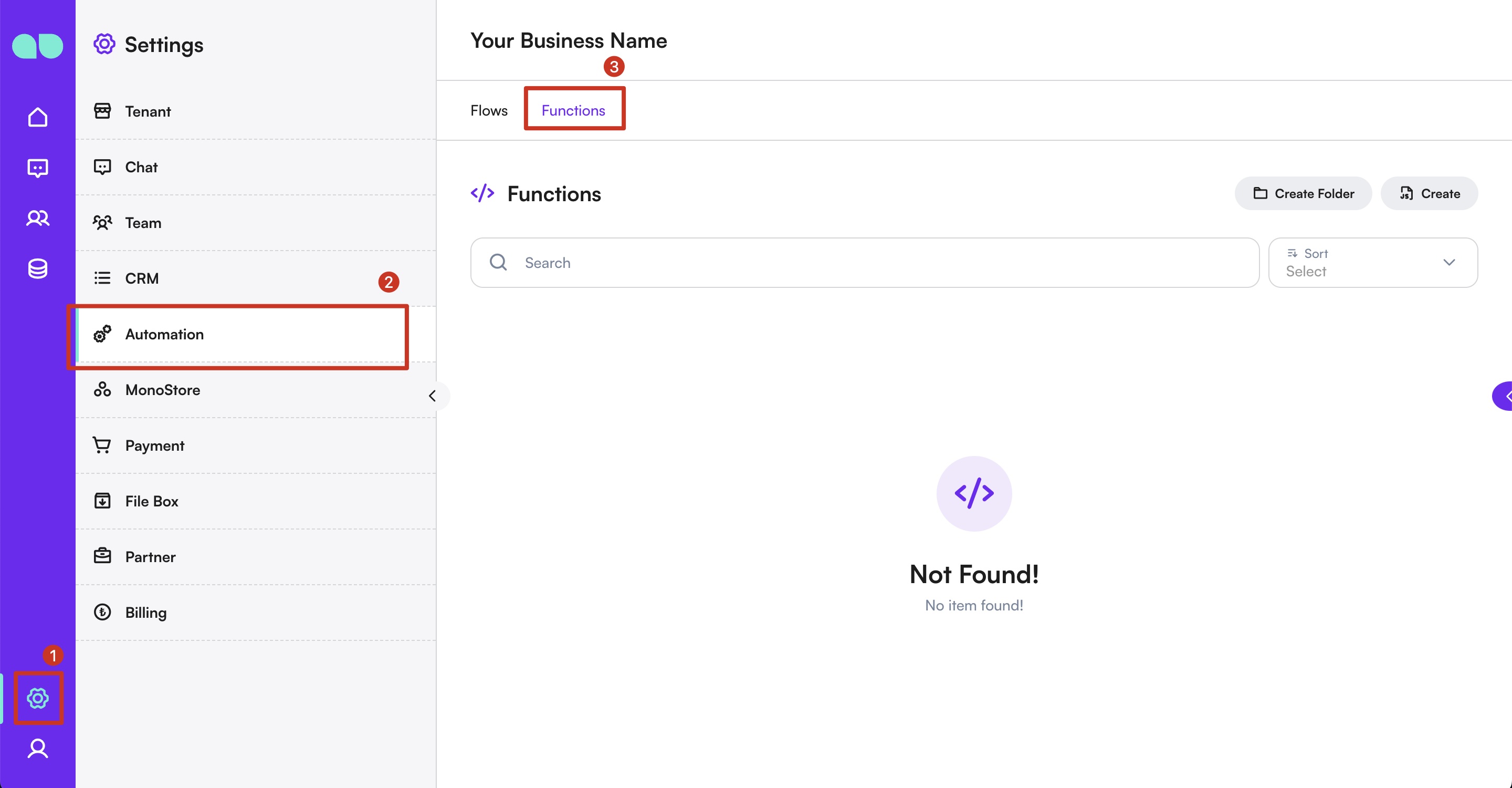Functions Management
In MonoChat, the Functions Management feature enables users to create and manage custom functions that can be integrated into various flows. These functions can perform specific business logic, interact with external services, and even create custom views or collections. This powerful capability allows businesses to tailor their automation and interaction workflows to meet unique requirements.
Complex Event Processing
MonoChat’s Flow feature is built on advanced Complex Event Processing (CEP) principles. CEP allows the system to analyze and react to event patterns in real-time, making it possible to automate complex business processes. With MonoChat, businesses can leverage CEP to create sophisticated flows that respond to various events, trigger actions, and integrate seamlessly with external systems.
Functions Management Interface
The Functions Management interface in MonoChat provides a user-friendly environment to create, update, and manage custom functions. Here are the key components and their functionalities:

Create Function
- Name: Enter the name of the function.
- Outputs: Define the outputs of the function.
- Function Selector: Choose an existing function or create a new one.
- Function Type: Select the type of function from the available options, such as Cron Job, API Endpoint, Custom App Setup, or Custom Flow Node.
Update Function
The update function screen allows you to modify existing functions. You can update the code, change the type, and adjust other settings as required.
Custom Views and Collections
MonoChat supports Custom Views and Custom Collections, allowing businesses to create tailored interfaces and manage their own databases.
- Custom View: This type of function enables the creation of special screens within MonoChat. These screens can display data from external services or custom collections, providing a unique interface for specific business needs.
- Custom Collections: These allow businesses to define their own data structures and store custom data within MonoChat. This feature is particularly useful for businesses that need to manage specialized information not covered by default MonoChat functionalities.
Nested Folder Structure
MonoChat’s Functions Management supports an intuitive nested folder structure. Users can navigate through different folders and subfolders to organize their functions systematically. This structure allows for better management and easy access to specific functions within the desired folder.
Steps to Create a Function
- Navigate to the Functions Tab: Go to the Functions tab under the Automation section.
- Click on Create: Open the creation drawer by clicking the "Create" button.
- Enter Function Details: Fill in the name, outputs, and select the function type.
- Define the Function: Write the code for the function or select an existing template.
- Save the Function: Click on the "Save" button to add the function to your library.
Use Cases
Business Logic
- Custom Logic: Implement specific business rules and specialized logic for unique business processes, such as calculating discounts, processing orders, validation, or custom calculations. This allows businesses to tailor workflows and automation to their specific needs.
External Service Integration
- API Integration: Create API endpoints to allow external applications to access and retrieve data from MonoChat. This enables seamless integration with third-party services like CRM systems, payment gateways, or data analytics platforms, ensuring smooth data flow and interoperability.
- Data Synchronization: Automate the synchronization of data between MonoChat and other systems to ensure consistency and accuracy, making sure all platforms are up-to-date and aligned.
Custom Interfaces
- Custom Interfaces: Develop custom dashboards or data entry forms tailored to the business’s specific needs. This provides a personalized interface for agents and employees, enhancing usability and efficiency.
Data Management
- Data Management: Define custom collections to store and manage unique business data. This helps in organizing and maintaining important information, enabling easy access and reporting.
Scheduled Automation
- Scheduled Automation: Use cron jobs to automate routine tasks, such as generating reports or performing regular system updates. This ensures that essential tasks are completed on time without manual intervention, improving operational efficiency.
The Functions Management feature in MonoChat is a versatile tool that empowers businesses to customize their automation workflows extensively. By leveraging custom functions, views, and collections, businesses can ensure their MonoChat environment aligns perfectly with their operational requirements.